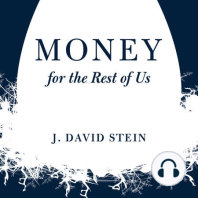25 min listen
Why Are Investment Returns So Low?
ratings:
Length:
30 minutes
Released:
May 9, 2018
Format:
Podcast episode
Description
#204 How low real interest rates contribute to low returns for stocks and other risk assets. How real interest rates are determined. More information, including show notes, can be found here.Episode SummaryLow investment returns are never the best news for financial investors. On this episode of Money For the Rest of Us, David examines the relationships between real interest rates and investment return, who or what is driving real rates, and offers historical information on previous periods of low rates. His insights will shed light on this concerning issue, so be sure to give this episode your full attention.The US and the world are in a period of low real interest rates and real returnsUniversity endowments, retirement funds, and individual portfolios are currently affected by low-interest rates and low investment rates. If this continues, overall portfolio values could decrease after adjusting for inflation and spending. In the United States, we have seen an average 6.5% real return on stocks since 1900. The global average for real return rates has been hovering around 5.2%. However, these rates have been lower in the past 2 decades than they have been in the previous 80 years.There’s a linkage between real interest rates and subsequent asset class returnsDavid delves into research on the relationship between real interest rates and subsequent investment returns on this episode of Money For the Rest of Us. He explains that when real rates were higher, the returns were much higher. For example, when real rates reached 9%, real returns on stocks were as high as 10.8%. Today, the real rates hover around 0% or even dip into the negative percentages. The real return for stocks at these rates have historically been just over 4%.What drives these low real rates?After hearing all of this information, listeners may be asking, “So who or what is driving these low real rates? And can they be manipulated to be higher to produce higher returns?” David quotes Former Federal Reserve Chairman Ben Bernanke who explains, “But what matters most for the economy is the real, or inflation-adjusted, interest rate. The real interest rate is most relevant for capital investment decisions, for example. The Fed’s ability to affect real rates of return, especially longer-term real rates, is transitory and limited. Except in the short run, real interest rates are determined by a wide range of economic factors, including prospects for economic growth—not by the Fed.”Essentially, no group or institution can manipulate these rates. What DOES influence these rates is the balance between those who save and those who borrow. Currently, the world is in a period of high savings and less borrowing, resulting in lower interest rates and lower returns. The tides for these rates will change, in time.Very long periods of time are required to balance out the good and bad luck for investment returnsKeep in mind that all of the data discussed in this episode of Money For the Rest of Us are for relatively short periods of time. A recent historical analysis shows that countries have seen periods of negative real returns for as long as 16, 54, and 55 years in the US, France, and Germany, respectively. Still, the long-term historical record shows positive real returns for stocks. It just takes patience.Episode Chronology[1:00] Why are investment returns so low?[11:00] The correlating relationship between real interest rates and subsequent returns[15:40] Who or what exactly drives real rates?[27:17] Returns can deviate from these low interest rates
Released:
May 9, 2018
Format:
Podcast episode
Titles in the series (100)
Should You Invest In Individual Stocks? by Money For the Rest of Us
